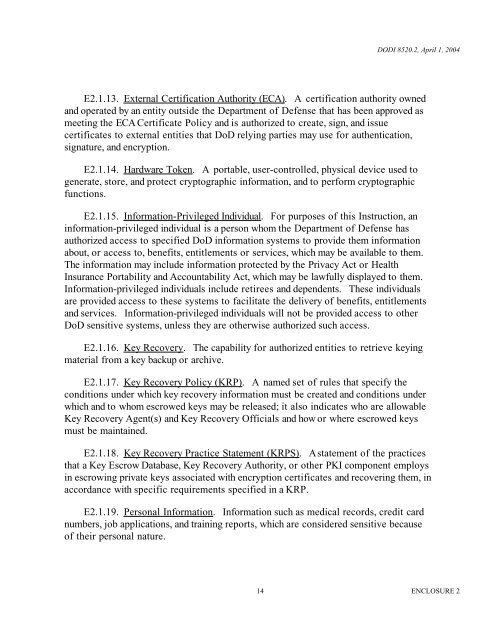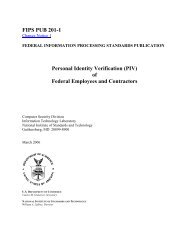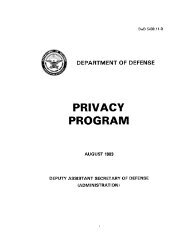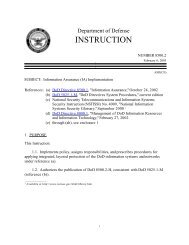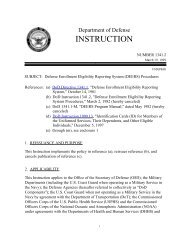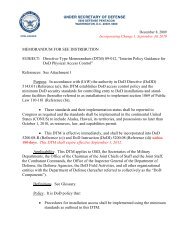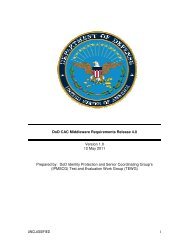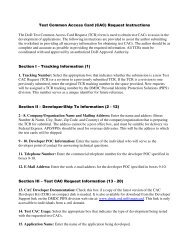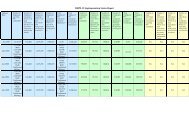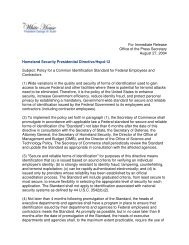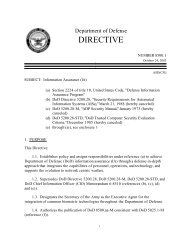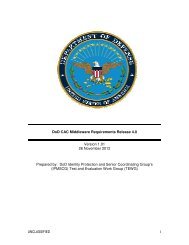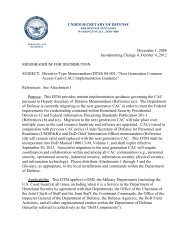DoD Instruction 8520.2, April 1, 2004 - Common Access Card (CAC)
DoD Instruction 8520.2, April 1, 2004 - Common Access Card (CAC)
DoD Instruction 8520.2, April 1, 2004 - Common Access Card (CAC)
You also want an ePaper? Increase the reach of your titles
YUMPU automatically turns print PDFs into web optimized ePapers that Google loves.
DODI <strong>8520.2</strong>, <strong>April</strong> 1, <strong>2004</strong><br />
E2.1.13. External Certification Authority (ECA). A certification authority owned<br />
and operated by an entity outside the Department of Defense that has been approved as<br />
meeting the ECA Certificate Policy and is authorized to create, sign, and issue<br />
certificates to external entities that <strong>DoD</strong> relying parties may use for authentication,<br />
signature, and encryption.<br />
E2.1.14. Hardware Token. A portable, user-controlled, physical device used to<br />
generate, store, and protect cryptographic information, and to perform cryptographic<br />
functions.<br />
E2.1.15. Information-Privileged Individual. For purposes of this <strong>Instruction</strong>, an<br />
information-privileged individual is a person whom the Department of Defense has<br />
authorized access to specified <strong>DoD</strong> information systems to provide them information<br />
about, or access to, benefits, entitlements or services, which may be available to them.<br />
The information may include information protected by the Privacy Act or Health<br />
Insurance Portability and Accountability Act, which may be lawfully displayed to them.<br />
Information-privileged individuals include retirees and dependents. These individuals<br />
are provided access to these systems to facilitate the delivery of benefits, entitlements<br />
and services. Information-privileged individuals will not be provided access to other<br />
<strong>DoD</strong> sensitive systems, unless they are otherwise authorized such access.<br />
E2.1.16. Key Recovery. The capability for authorized entities to retrieve keying<br />
material from a key backup or archive.<br />
E2.1.17. Key Recovery Policy (KRP). A named set of rules that specify the<br />
conditions under which key recovery information must be created and conditions under<br />
which and to whom escrowed keys may be released; it also indicates who are allowable<br />
Key Recovery Agent(s) and Key Recovery Officials and how or where escrowed keys<br />
must be maintained.<br />
E2.1.18. Key Recovery Practice Statement (KRPS). A statement of the practices<br />
that a Key Escrow Database, Key Recovery Authority, or other PKI component employs<br />
in escrowing private keys associated with encryption certificates and recovering them, in<br />
accordance with specific requirements specified in a KRP.<br />
E2.1.19. Personal Information. Information such as medical records, credit card<br />
numbers, job applications, and training reports, which are considered sensitive because<br />
of their personal nature.<br />
14 ENCLOSURE 2


